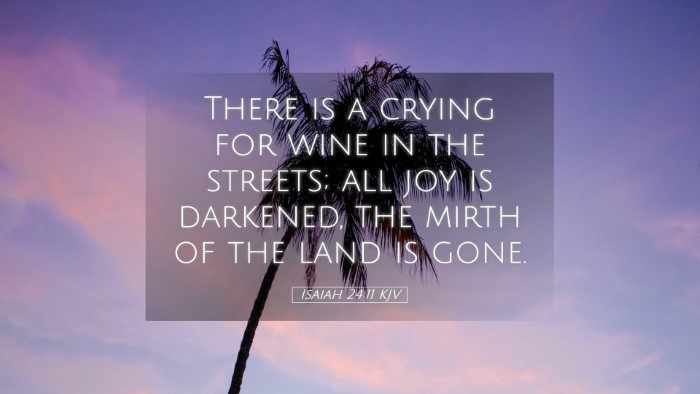Commentary on Isaiah 24:11
Text of Isaiah 24:11: "There is a cry for wine in the streets; all joy is darkened, the mirth of the land is gone."
Introduction
The prophecy contained within Isaiah 24 presents a vivid picture of desolation and loss, serving as a poignant reflection on divine judgment. This verse encapsulates the despair that accompanies God’s righteous indignation against a sinful world. In examining this text, we rely on insights from esteemed commentators such as Matthew Henry, Albert Barnes, and Adam Clarke, whose works provide depth and clarity to the meaning and implications of this profound statement.
The Context of Isaiah 24
Before delving into verse 11, it is imperative to understand the broader context of Isaiah 24. This chapter speaks of a global calamity, indicating that not just Israel but all nations are subject to God's judgment. As seen in verses leading up to 11, the entire earth is affected, and the landscape of society is irrevocably altered.
Analysis of Key Phrases
"There is a cry for wine in the streets"
Wine, in biblical times, symbolized joy and celebration. The widespread cry for wine illustrates the deep despair and longing for joy that has been stripped away. According to Albert Barnes, this cry signifies the desperation of a people who, once privileged and joyous, find themselves in a state of mourning and deprivation.
"All joy is darkened"
This phrase underscores the complete removal of joy, which is a vivid illustration of the desolation brought by the judgment of God. Matthew Henry comments on how this darkening reflects not merely a temporary state but a profound spiritual and emotional void, marking a critical moment of reckoning for mankind.
"The mirth of the land is gone"
When mirth—the expression of joy and gladness—vanishes, it signals the end of hope for restoration without divine intervention. Adam Clarke discusses how this loss of mirth represents a broader societal and spiritual calamity, affecting not just individuals but entire communities who find themselves bereft of the joys that once characterized their lives.
Theological Insights
This verse serves as a stark reminder of the realities of divine judgment. The theological underpinnings reflect the nature of sin and its consequences. The removal of joy is not merely a punitive measure; it is indicative of a profound relationship between the divine and humanity. Henry offers insights into how God’s displeasure leads to the withdrawal of joy as a means to draw the wayward back to repentance and reverence for the Creator.
Implications for Pastoral Ministry
For pastors and ministry leaders, Isaiah 24:11 presents opportunities for teaching with a focus on the consequences of sin, the nature of repentance, and the hope of restoration. The stark contrast between joy and desolation serves as a powerful lesson for congregants. It is crucial to educate the flock about the importance of living a life aligned with God’s will, understanding that the absence of joy is a consequence of spiritual separation from Him.
Applications for Modern Society
Contemporary readers are encouraged to draw parallels between this prophetic lament and the modern world's struggles. In a society rife with moral decay and spiritual emptiness, this verse resonates deeply. The cries for joy—often sought in superficial pleasures—highlight the urgent need for genuine faith and reliance on Christ. Barnes suggests that recognizing this pattern in society enables believers to actively engage in mission work that addresses both spiritual and physical needs.
Conclusion
Isaiah 24:11 serves as both a warning and a call to reflection. The words reflect a reality that transcends time, reminding all believers of the vital importance of maintaining a relationship with God, who is the ultimate source of joy. As this commentary has explored, the insights from Henry, Barnes, and Clarke collectively inform a richer understanding of this verse, inspiring deeper theological reflection and pastoral application.


